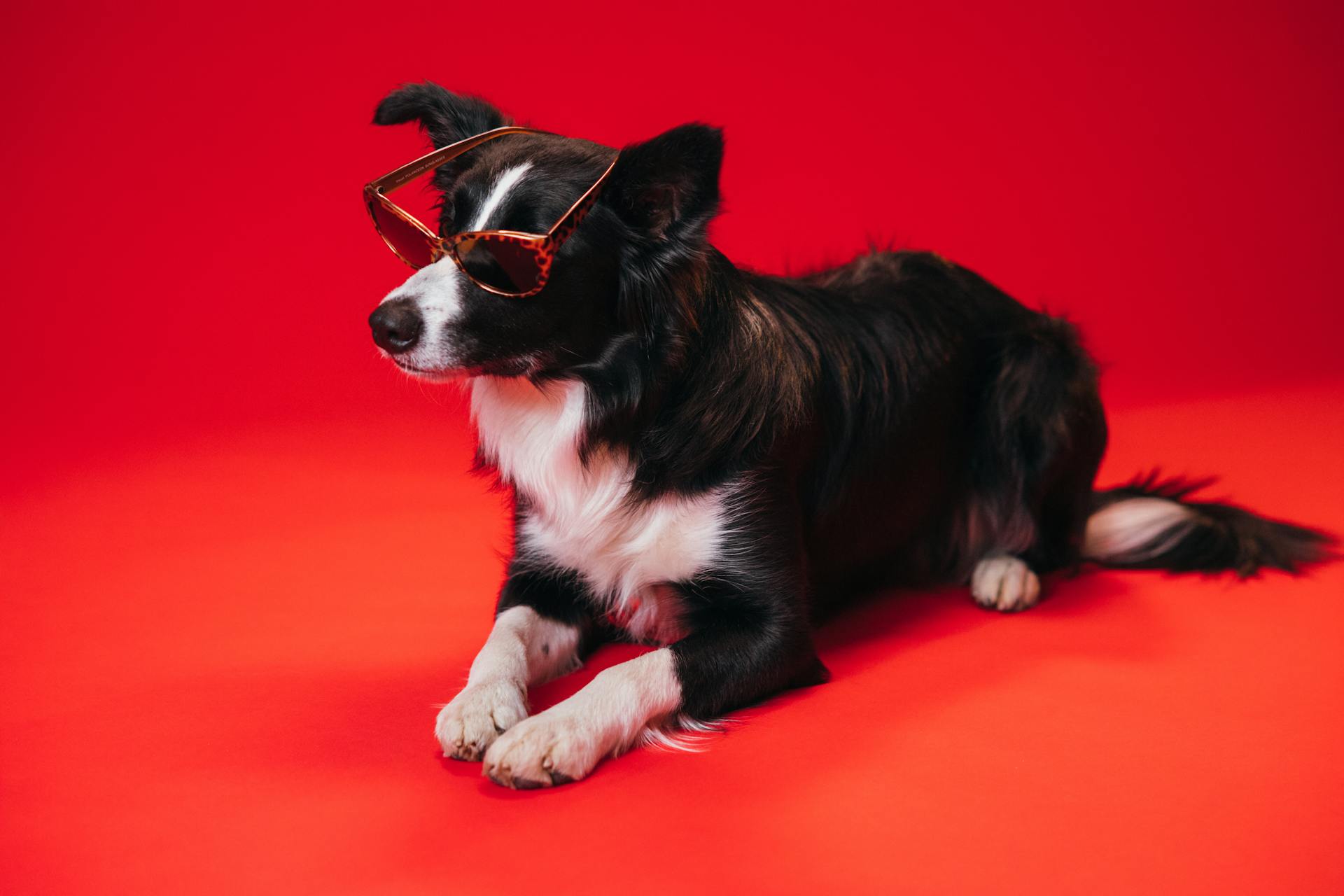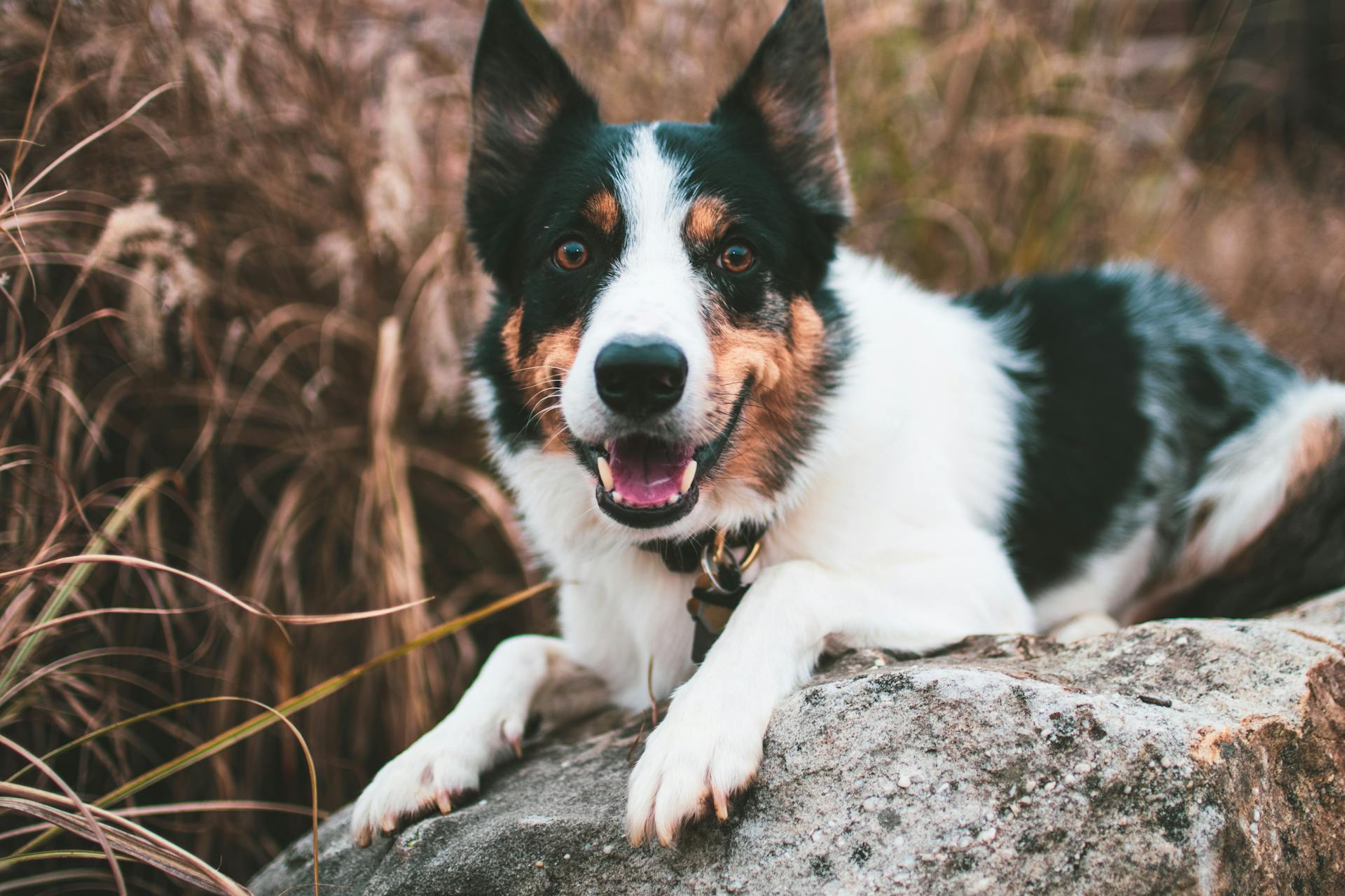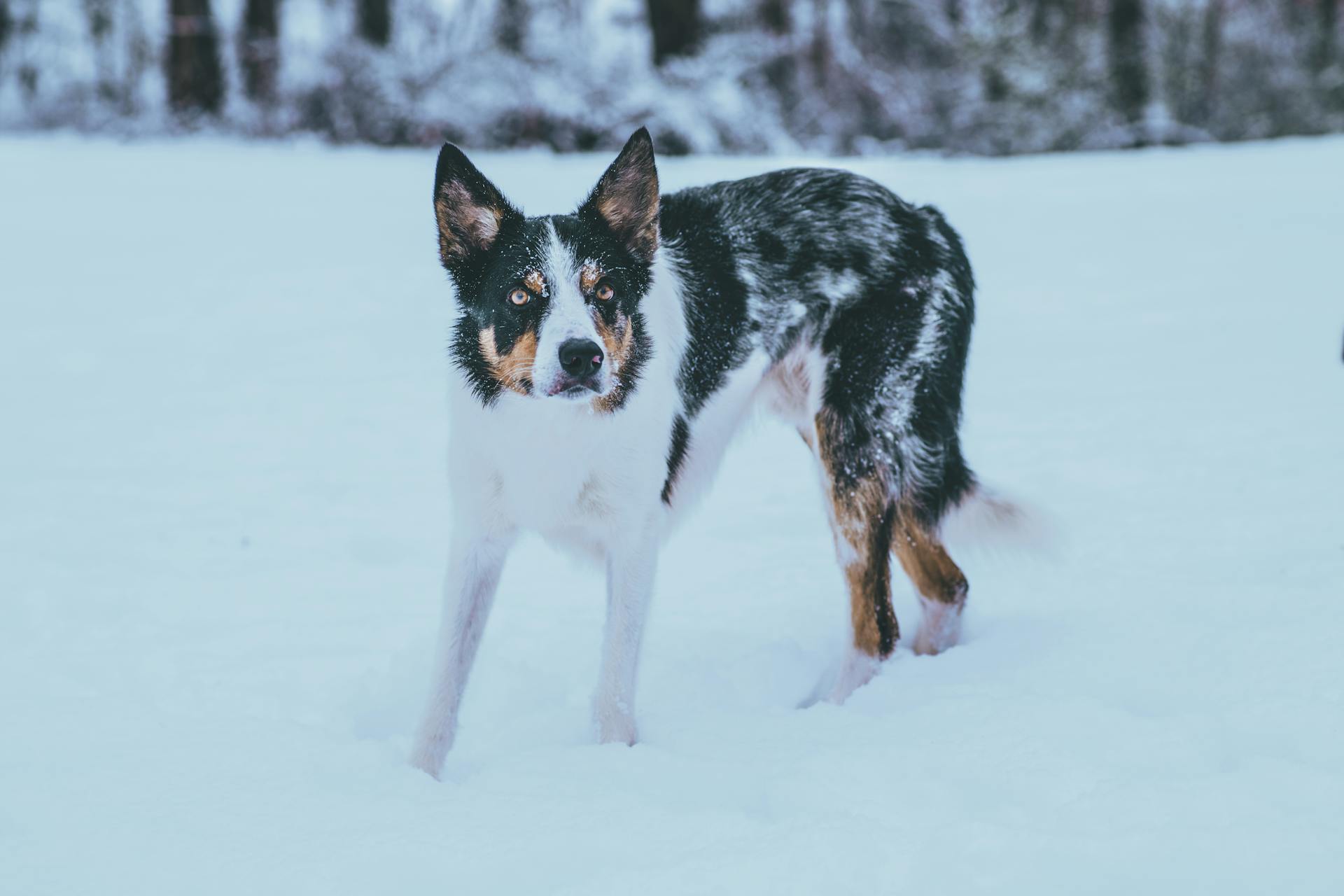
Training a Border Collie requires early socialization and exposure to various environments, people, and animals, which can be done as early as 8 weeks old. This is crucial for developing good behavior and reducing anxiety.
Socialization is a critical component of Border Collie training, and it's essential to start this process as soon as possible. A well-socialized Border Collie is less likely to develop behavioral issues later in life.
Border Collies are highly intelligent dogs that thrive on mental and physical stimulation, making them well-suited for active families or individuals who can provide regular exercise and playtime.
Understanding Border Collies
Border Collies are supremely intelligent and brimming with energy. They're born with an instinct to work and respond extremely well to training, making them ideal for jobs like mountain rescue or sniffer dog work.
Their original purpose was to herd sheep, where they'd act as a barrier to guide them in the right direction. They're intelligent and quick on their feet, making them well-suited for this task.
Border Collies have a brilliant work ethic ingrained in their minds, which means they thrive on company and stimulation. They're loyal and faithful pets that make great companions for active owners.
Understanding Your Perspective
Border Collies are intelligent dogs that respond well to training, but they don't come pre-programmed to understand specific cues. You need to think about the dog's perspective and make the learning process as straightforward as possible.
To effectively train your Border Collie, it's essential to put yourself in their shoes and understand their natural instinct to work. They thrive on company and stimulation, so training should be a fun and rewarding experience for them.
Breaking down training into simple steps can help your Border Collie learn faster and more efficiently. This is especially true for basic commands like "sit" and "stay", which can be overwhelming if presented as a single task.
Socialisation is crucial for Border Collie puppy training, and it should be done early on. Expose your puppy to various environments, people, and other animals to help them develop good social skills and reduce anxiety.
To help your Border Collie puppy develop self-control, teach them impulse control games and real-life situations. This will help with basic doggie manners like walking on a loose lead and waiting for commands.
Here are some key things to consider when understanding your Border Collie's perspective:
- They don't understand specific cues, so you need to teach them in a way that makes sense to them.
- They thrive on company and stimulation, so training should be fun and rewarding.
- They need socialisation early on to develop good social skills.
- They need to learn self-control through impulse control games and real-life situations.
Types of
Border Collies are naturally inclined to work and learn quickly, making them a joy to train with the right approach. Reward-based training is particularly effective, as it builds enthusiasm, confidence, and trust between dog and handler.
Many Border Collies enjoy play as their reward of choice, which is great news for owners who love to engage in fun activities with their dogs. This method involves rewarding the dog with something they enjoy when they do a positive action.
Border Collies pick up new skills and tricks very quickly, which helps them become talented at various skills. This means they require a lot of mental stimulation to keep them happy and occupied, and prevent destructive behaviours.
Early socialisation is key to prevent reactivity in Border Collies, who often dislike unsolicited touch from humans and other dogs. Proper training can help combat this and ensure they stay peaceful in the presence of others.
Training Essentials
Training your Border Collie requires some essential supplies, and I'm happy to share what you'll need to get started. Tennis balls are a must-have, with hundreds of them on hand to keep your puppy engaged and active.
A treat pouch is also a great idea, as it'll allow you to reward your puppy with tasty treats during training sessions. You can also use their regular dry food as a reward, but be sure to have plenty of goodies on hand.
A soft collar and harness are a must for your Border Collie puppy, as they're sensitive and reactive to their surroundings. Opt for a harness that doesn't pull or tighten when your puppy walks.
You'll also need a 2-meter training lead to give your puppy plenty of room to sniff and explore. A soft mat or non-slip vet bed is also a great idea for training sessions.
Here's a list of the essential supplies you'll need to get started:
- Tennis balls (hundreds!)
- Treat pouch
- Soft collar
- Harness
- 2-meter training lead
- Soft mat or non-slip vet bed
- Treats
- Two identical toys
- Soft grooming brush
Remember, these supplies will help you establish a strong foundation for training your Border Collie, but it's the quality time you spend with your puppy that will truly make the difference.
Training Techniques
Border Collies are highly responsive to training due to their intelligence and working backgrounds, picking up training quickly with positive reinforcement techniques.
Make sure to have training treats on hand as Border Collies respond exceptionally well to this method.
Their chasing and herding instinct means recall training is crucial before letting them off the lead to keep them safe.
To prevent boredom and mischievous behavior, Border Collies need long walks daily and plenty of playtime.
Here are some key training techniques to keep in mind:
- Positive reinforcement techniques
- Recall training
- Long walks and playtime
These simple yet effective techniques will help you train your Border Collie and strengthen your bond with them.
Exercise
Exercise is a crucial part of Border Collie training and development. This breed requires lots of physical activity to prevent boredom and mischievous behavior.
Border Collies need long walks daily, and plenty of playtime to keep them happy and engaged. Engage your dog in as many of your daily activities as you can, such as running, agility training, or even just playing fetch.
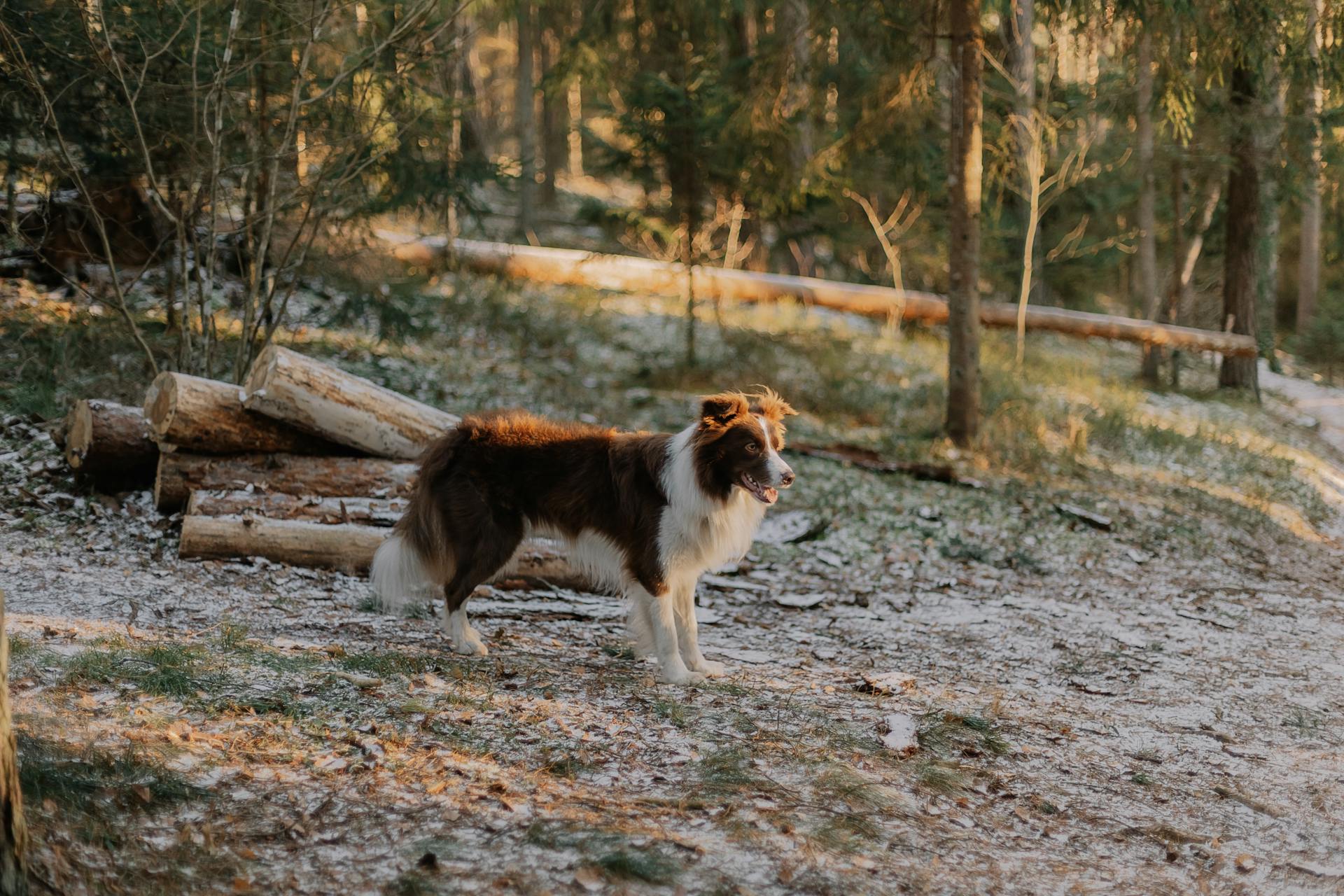
As a running buddy, Border Collies will love spending extra time out and about with their active owners. Flyball is the perfect activity for the energetic Border Collie, providing hours of fun chasing, jumping hurdles and socialising with other dogs.
To prevent problem behavior, Border Collies need mental stimulation as well as physical exercise. This intelligent breed loves a challenge, so keep them guessing with puzzle toys and plenty of mental stimulation.
Here are some essential exercise activities for your Border Collie:
- Long walks daily
- Plenty of playtime
- Running with their owner
- Agility training
- Fetch and other interactive games
- Flyball
By providing your Border Collie with plenty of exercise and mental stimulation, you'll be well on your way to raising a happy, healthy, and well-behaved companion.
Push, Drop, Stick
So, you want to know about Push, Drop, Stick? It's a training technique that helps keep your puppy engaged and motivated by systematically raising the difficulty of exercises or behaviors.
The idea is to avoid keeping exercises too easy, which can lead to progress being slower than it needs to be. By using Push, Drop, Stick, you can maintain enough momentum to keep your puppy interested without making it too easy for them.
Related reading: Are Border Collies Easy to Train
Here's how it works: you track how many repetitions of an exercise your puppy gets right out of 5. Based on their performance, you choose whether to push them to the next level of difficulty, drop back to an easier level, or stick with what they're doing.
Here's a quick guide to help you decide:
Remember, the goal is to keep your puppy engaged and motivated, not to make things too easy or too hard. By using Push, Drop, Stick, you can find the perfect balance and help your puppy reach their full potential.
Common Challenges
Training border collies can be a challenging task, but understanding the common obstacles that owners face can help you prepare and overcome them. One of the biggest challenges is the high energy level of border collies, which can lead to destructive behavior if not properly channeled.
Border collies require a minimum of 1-2 hours of exercise and mental stimulation per day to prevent boredom and restlessness. This can be achieved through activities such as running, agility training, and obedience exercises.
Housebreaking can be a significant challenge for some owners, especially if they have a busy schedule. Consistency and patience are key, as border collies need to learn to associate going outside with eliminating.
A well-designed training plan is essential to prevent confusion and frustration for both the owner and the dog. It's recommended to start with short training sessions and gradually increase the duration as the dog becomes more focused and attentive.
Some owners may struggle with the herding instinct of border collies, which can lead to nipping and biting if not properly managed. This can be addressed through early socialization and training that focuses on bite inhibition and gentle play.
Border collies are highly intelligent and thrive on mental stimulation, which can make them prone to separation anxiety if left alone for extended periods. Providing a safe and comfortable environment, such as a crate or a quiet room, can help alleviate this issue.
Explore further: Are German Shepherds Good for First Time Owners
Preventing Problems
Preventing problems before they begin is key to successful training. It's better to prevent problematic behaviors than to correct them later.
Border Collies are intelligent dogs, but they're not mind-readers. They need clear expectations and healthy alternatives to prevent unwanted behaviors like chewing on furniture. Provide them with dog-safe items to chew, like bully sticks or a stuffed Kong.
Exercise is essential for Border Collies. They have high energy levels and require a very active home. A daily habit of training and exercise will keep them stimulated and prevent boredom.
Here are some signs that your Border Collie might be struggling with frustration:
- They switch off or start acting silly (often a sign of stress)
- They resort to nipping
If you notice these signs, it's time to shift to some play and let them have some downtime. Revisit training later when they're calm and relaxed.
Remember, prevention is key. By setting clear expectations and providing healthy alternatives, you can prevent problems before they begin.
Tips and Tricks
Border Collies are high-energy dogs that require a lot of physical and mental stimulation. They need a very active home where they can run around and exercise every single day.
To prevent frustration, it's essential to provide them with an outlet for their herding instinct, such as playing games like Sheepball or tracking.
A good amount of exercise is crucial for Border Collies, and it's not just about physical activity - mental stimulation is equally important. They love to play games like tracking or searching, and they'll always be thrilled to do so.
If your Border Collie puppy starts acting silly or switches off, it may be a sign of stress, and they may resort to nipping. In this case, shift to some play and let them have some downtime before revisiting training.
Here are some key characteristics to keep in mind when training your Border Collie puppy:
- High energy levels and require a very active home
- Outstandingly smart and respond well to training
- Need mental and physical exercise every day
- Have a strong sense of smell and love to play tracking games
- Prefer to live in the countryside where they can run and imagine herding sheep
Mental Stimulation
Mental Stimulation is key to a happy and well-behaved Border Collie. A tired brain is just as important as a tired body, so make sure to provide mental stimulation through various activities.
Teach your Border Collie new tricks and skills to keep their mind engaged. You can also let them use their nose to hunt for food or sniff the grass while on walks. This will help keep them stimulated and satisfied.
Mental stimulation can be achieved through play with mentally stimulating toys, such as treat puzzles and snuffle mats. These toys will challenge your Border Collie's problem-solving skills and keep them engaged.
Making walks more stimulating is also a great way to provide mental stimulation. You can work on basic agility skills like weaving between your legs or practice commands like heel, sit, down, and stay.
Here are some ways to provide mental stimulation for your Border Collie:
- Teach them new tricks and skills
- Let them use their nose (hunt for food, sniff the grass while on walks, etc.)
- Let them play with mentally stimulating toys (treat puzzles, snuffle mats, etc.)
- Make walks more stimulating with basic agility skills and training
Top 10 Tips
1. Keep in mind that Border Collies have high energy levels and require a very active home.
Border Collies are intelligent and need training to keep them stimulated every single day. This is especially true for puppies, who need to burn off excess energy.
2. Provide a safe space for your Border Collie to relax and calm down, such as a crate or a separate room.
Intelligent breeds like Border Collies may have a hard time settling down and resting, so it's essential to train them to chill out alone.
Additional reading: How Much Exercise Do Border Collies Need
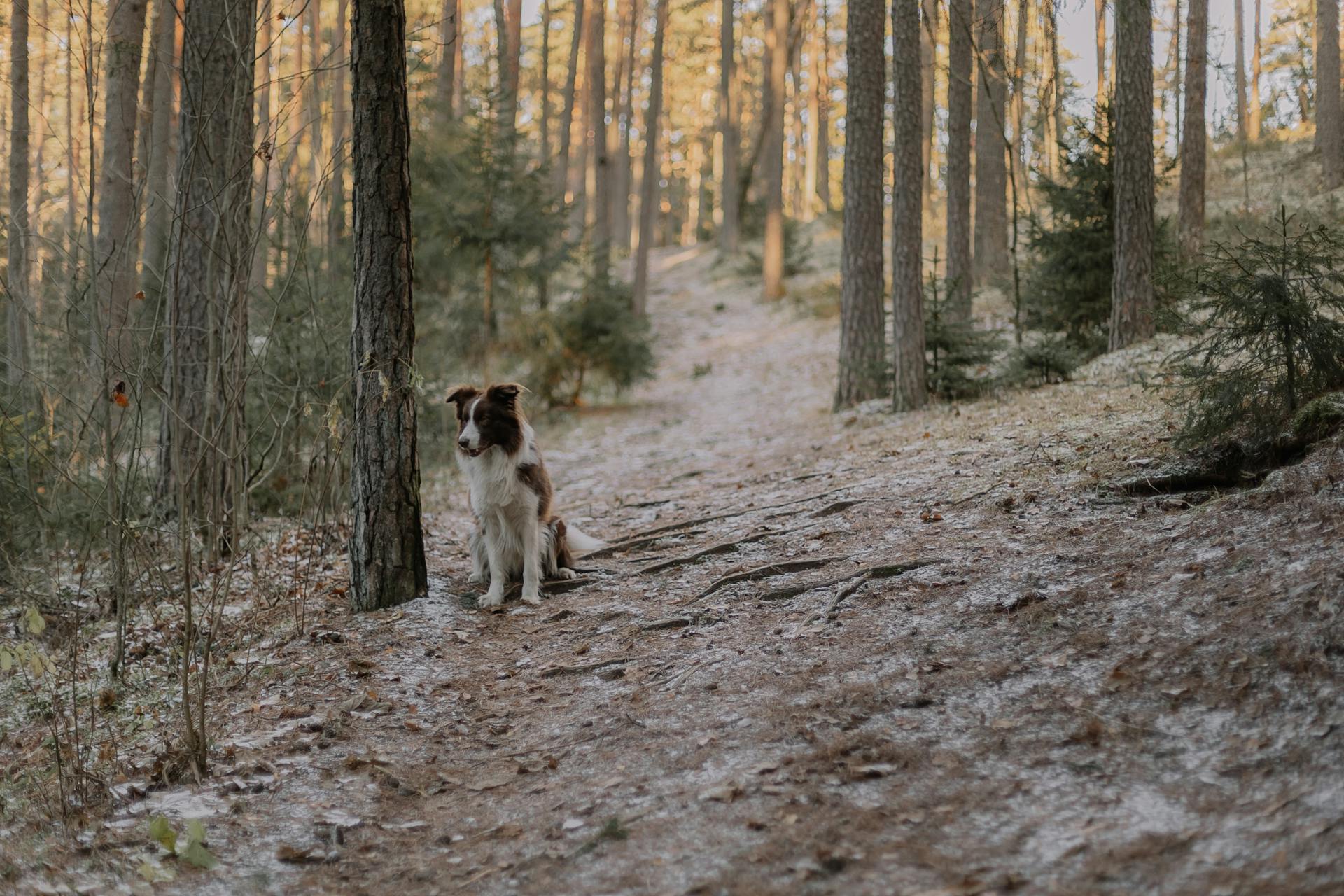
3. Expect your Border Collie to retain their herding instinct, so provide an outlet for this behavior, such as a game of Sheepball.
This will help prevent them from getting frustrated and acting out in other ways.
4. A good amount of exercise is crucial for Border Collies, both physically and mentally.
This will keep them busy and prevent them from getting into trouble.
5. Provide regular mental stimulation, such as tracking or searching games, to keep your Border Collie engaged.
Their strong sense of smell makes them perfect for these types of activities.
6. Be prepared to get wet and dirty with your Border Collie, as they love playing in all weather conditions.
This means you'll need to be prepared to join them in the mud!
7. Use positive reinforcement training methods to associate training with fun, rather than something to be dreaded.
If your Border Collie starts acting silly or stressed, try shifting to a play activity to help them relax.
8. Use games like the Push Drop Stick game to assess your puppy's readiness for more advanced training.
Check this out: Brain Games for Border Collies
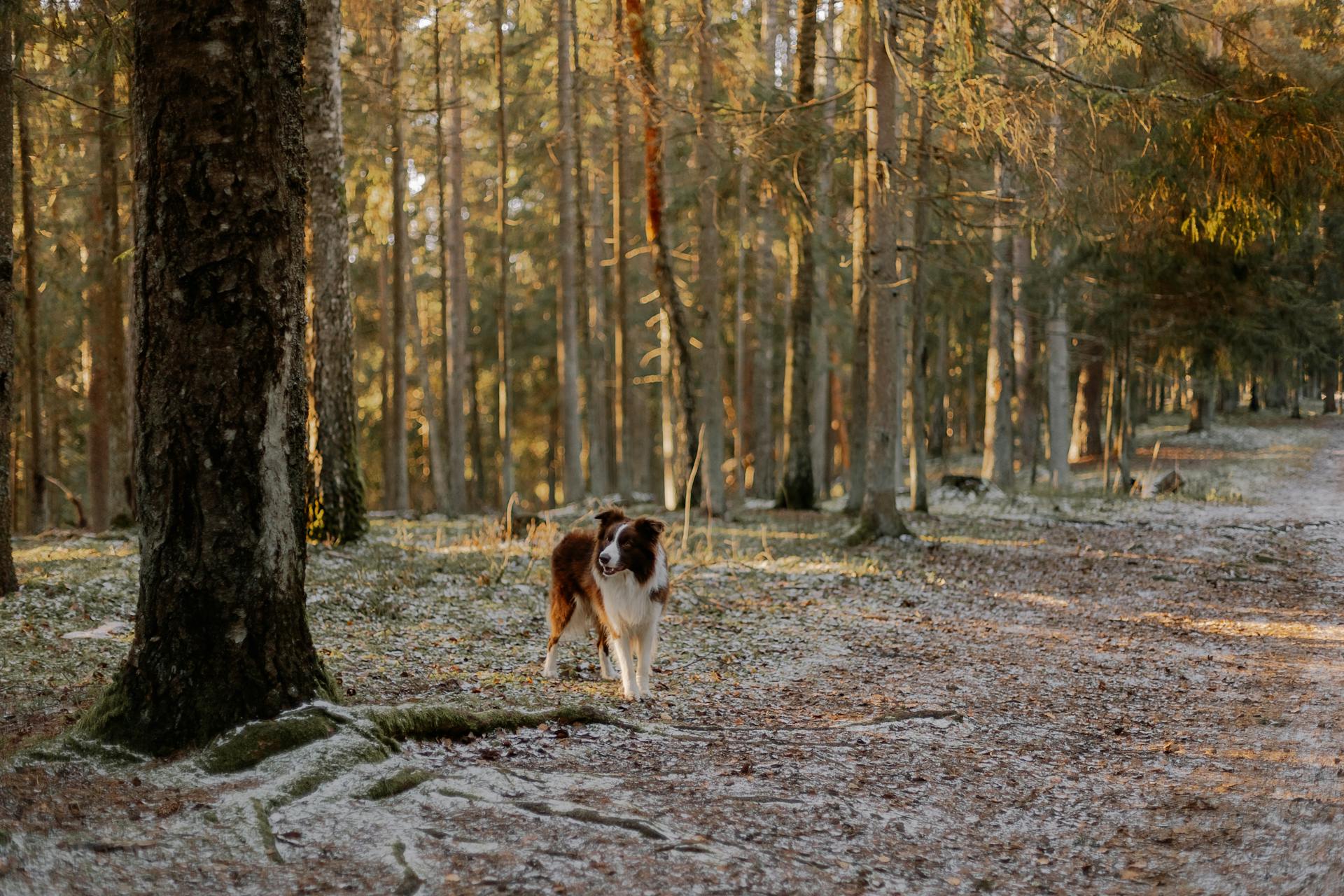
This game can help you determine if your puppy needs more practice or is ready to move on.
9. Establish clear boundaries and expectations for your Border Collie, including relaxation and alone time.
This will help them understand what's expected of them and be happy and well-behaved.
10. Reward your Border Collie for resting quietly in their safe space, such as a crate or a bed.
This will help reinforce the behaviors you want to see and make it easier to train them to chill out alone.
Alternative Career Paths
Border Collies have an incredible range of talents that can be developed with proper training, and one of the most exciting things is the variety of alternative career paths they can pursue.
They're naturally inclined for scent detection, thanks to their keen sense of smell.
Their intelligence and trainability make them a top contender for working trials.
With patience and practice, they can excel in agility and obedience training.
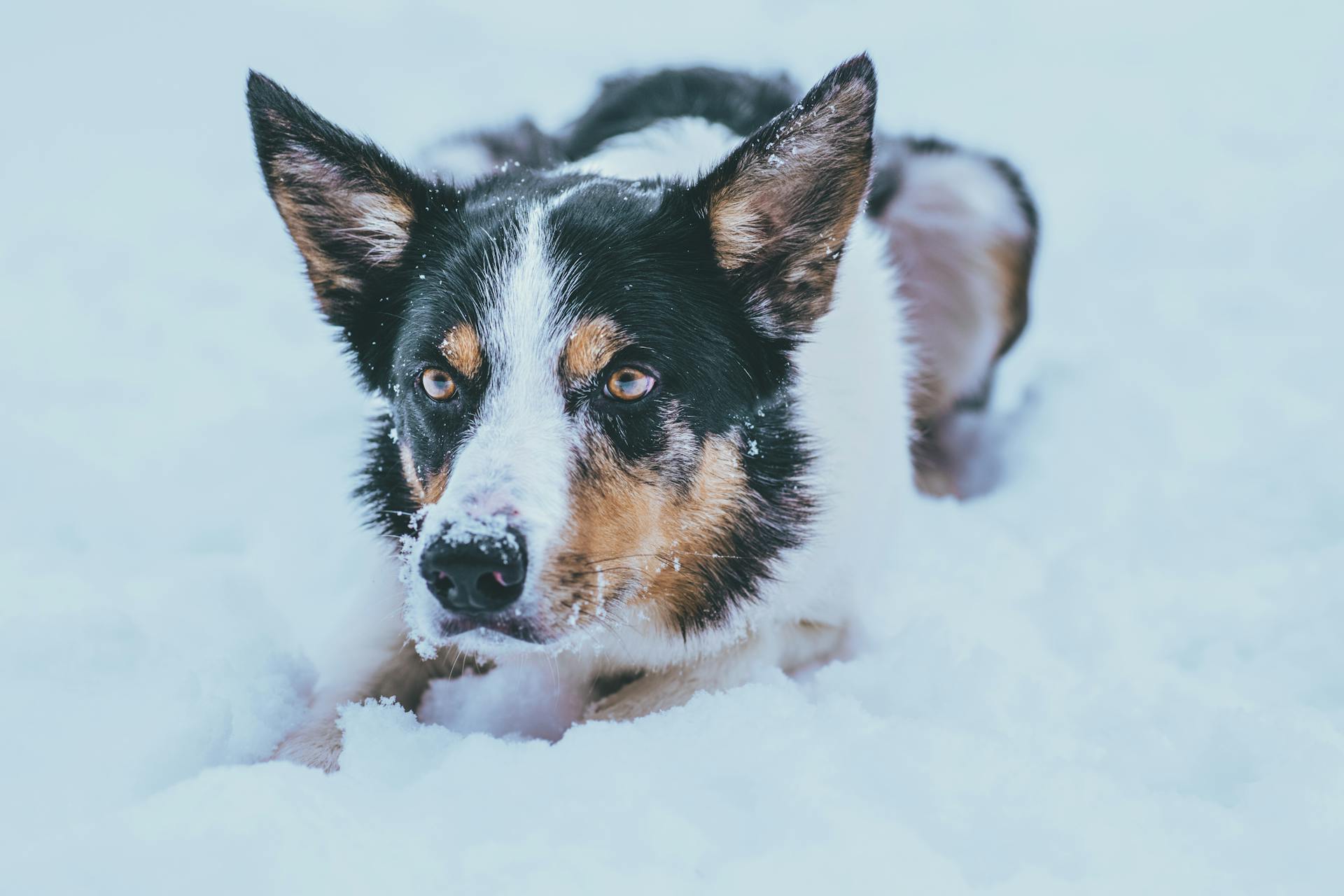
Their athleticism and love for play make them a natural fit for frisbee and other fun activities.
At the top of the canine intelligence and trainability rankings, Border Collies have a unique ability to learn and adapt quickly.
Their versatility and trainability make them a great fit for many different roles, and with the right training, the possibilities are endless.
Frequently Asked Questions
What not to do with Border Collies?
Don't coddle or overindulge Border Collies, as this can create dependence and undermine their natural independence. Treat them with respect and allow them to be dogs, not children or pets.
What is the most difficult age for a Border Collie?
Border Collies typically face challenges during adolescence, a period marked by physical growth and hormonal changes. This age range, around 1-3 years, can be a critical time for the breed.
What age should you start training a Border Collie puppy?
Border Collie puppies can start training as soon as they come home, typically around 8-10 weeks old. Early training sets the foundation for a well-behaved and intelligent companion
How do you discipline a Border Collie puppy?
To discipline a Border Collie puppy, calmly say "no" and redirect the behavior to an acceptable action, then praise and reward the desired behavior. This positive approach helps your puppy learn good habits and reduces unwanted behavior.
Sources
- https://www.petplan.co.uk/pet-information/dog/breed/border-collie/
- https://zigzag.dog/en-us/blog/puppy-training/breed-specific/guide-how-to-train-border-collie-puppy/
- https://www.oneminddogs.com/blog/how-to-train-your-border-collie-5-key-steps/
- https://royvon.co.uk/border-collie/
- http://www.lovelybordercollie.com/training/border-collie
Featured Images: pexels.com

